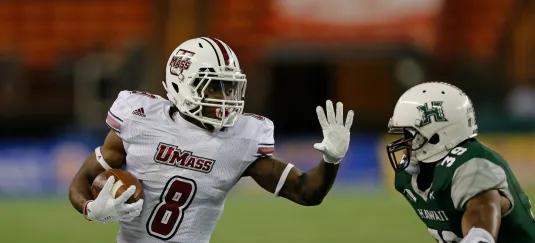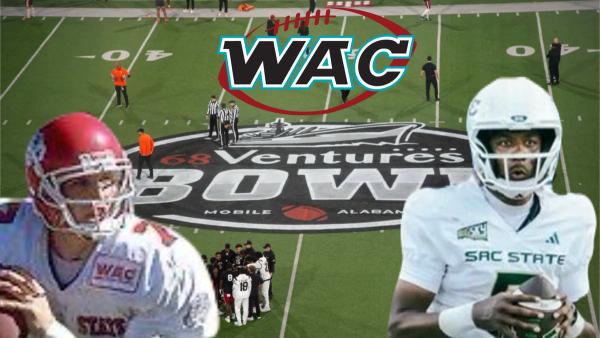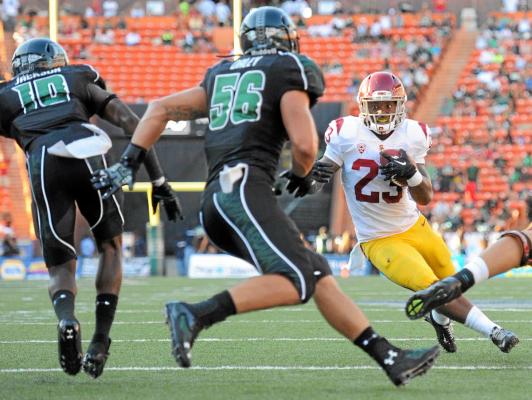•
Written By
Written By
•
•
•
Loading article...
Written By
Written By
With UMass joining the MAC we ask the question everyone has been wondering. Will the Minutemen and Warriors keep this uniquely strange series?
Written By
Omar-Rashon Borja
Senior Writer, Editor, Historian
Written By
Omar-Rashon Borja
Senior Writer, Editor, Historian

Joining a conference is a win-lose situation for independents at first. The stress of formulating a 12-game schedule without the assistance of a conference is unenviable, but canceling several non-conference series on short notice is equally painstaking. UMass finds itself in this predicament with its impending MAC membership that begins in 2025. Several questions loom, such as the future of the UConn-UMass rivalry, but one non-conference series stands out.
In 2026, UMass scheduled a trip to Hawaii for their season finale on Thanksgiving weekend. The Rainbow Warriors would return the favor the following year and kick off the 2027 season in Amherst. UMass now has only four non-conference openings per season, thus jeopardizing this series.
It does not take a geography degree to realize why this series is one of necessity. Oregon canceling their trip to Hawaii this season brought the declining allure of playing at Hawaii to the forefront of college football. Consequently, Hawaii has two FCS schools on the schedule for the first time since 1979. The prolonging of the season brought on by the 12-team Playoff and the Clarence T.C. Ching Athletic complex's small seating capacity and lack of facilities for opposing teams make trips to Hawaii more of a high-risk, low-reward venture.
These scheduling barriers for Hawaii and UMass' independence made this series a logical match. Now, the Minutemen must cut several non-conference series, and Hawaii looks like one of the first omissions. However, there is reason to believe this series stays on the schedule.
UMass has eight games scheduled for 2026. Three are against MAC schools, immediately eliminating them from the schedule. Another game comes against Army, who joined the AAC after a 19-season stint as an independent. Army athletic director Mike Buddie mentioned he would like a Power Five game and an FCS game to accompany yearly matchups against Air Force and Navy on the non-conference schedule. This philosophy likely cuts Army off the 2026 schedule.
Losing these four games leaves UMass with four non-conference games, including the Hawaii game. Not only will UMass not have to drop a non-conference game, but they can even add a game thanks to the Hawaii Exemption.
Unfortunately, the 2027 Hawaii-UMass game is more difficult to keep on the schedule. UMass has eight non-conference games scheduled in 2027. Only the Minutemen's games with Buffalo and Army are certain schedule subtractions. UMass may look to postpone Hawaii's return trip to Amherst to another year as a gesture of goodwill for the Rainbow Warriors helping UMass in their independent era. However, the 2027 game is a Week Zero game. The exposure brought by a game on the first Saturday of the season with limited competition could be too enticing for UMass to give up.
Like so much in college football, this decision comes down to money. UMass could pay Hawaii to buy out the contract and schedule an FCS game in their place. After all, the Minutemen do not have an FCS school scheduled in 2026 or 2027. UMass could replace Hawaii with Northeast Conference schools in both years at a substantially low price. UMass will pay Central Connecticut State $250,000 and Wagner $300,000. The Central Connecticut State payout is the second-lowest payout for an FBS-vs.-FCS game, while the Wagner payout is the fifth-lowest. Bringing in excited local FCS fanbases who will travel in better numbers than Hawaii fans is the more fiscally logical decision than traveling outside the contiguous United States and hosting a small traveling party from the island.
Week Zero exposure and a proliferation of series with MAC schools could keep college football's wackiest home-and-home series alive. In the end, money matters regarding the viability of this series, with UMass joining a conference.
While random, the series was symbolic of two schools at a crossroads. Hawaii and UMass are poster children of the schools left behind by the changing landscape of FBS football. Hyper-focus on the College Football Playoff has scared schools from playing at Hawaii, while UMass struggled to put schedules together as an independent. UMass' stabilizing move to the MAC could further magnify Hawaii's non-conference scheduling woes.

